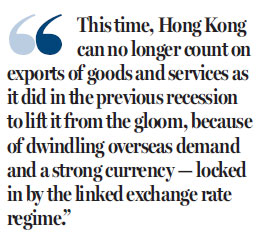HK economy needs stimulation
Updated: 2016-04-15 07:39
By Peter Liang(HK Edition)
|
|||||||
Peter Liang warns that the SAR's economy could be plunged into a recession unless the right measures are introduced to reverse the downward trend
The latest economic indicators are showing that Hong Kong is heading toward a recession that could run longer and deeper than the previous one triggered by the outbreak of the Asian financial crisis in 1997.
The external force which wrought havoc on the local economy in 1997 was the sudden and almost massive withdrawal of foreign capital from the region. This led to the collapse of the currencies of several major regional economies, particularly Thailand, Indonesia and South Korea. The subsequent attacks on Hong Kong's linked exchange rate system mounted by various hedge funds shook confidence enough to trigger a massive exodus of funds.
During all this mayhem, the foundation of the economy remained solid due to stability on the mainland, which resisted pressure to devalue its currency, and the strength of the major overseas markets in the US and Europe. Even during the worst of times when demand in Hong Kong fell and asset prices collapsed, exports, including shipments to and from the mainland, remained robust.
Fast forward to 2016.
Monthly figures show that exports have been on the slide since the latter part of 2015, while the outlook has remained bleak. A slowdown in the mainland's economic growth and persistent weak demand by the troubled economies of the US, Europe and Japan have combined to depress the growth in exports, a major pillar of the local economy. The latest Nikkei Hong Kong purchasing managers' index dropped to 45.5 in March, down from 46.4 in February. A reading of below 50 indicates a contraction.
The local sector does not look that rosy either. Private sector investment is expected to slacken further in coming months because of the property market slump. Home prices have fallen on average by about 20 percent from their peak in early 2015.
The government said the price drop was nothing more than a cyclical adjustment while demand has remained strong. But industry heavyweights are less sanguine. At least two major developers, Li Ka-shing of Cheung Kong and Li Shau-kee of Henderson Land, have predicted worse times ahead for the property sector.
Most worrying is the projected increase in unemployment, which could have a far-reaching impact not only on local consumption but on the banking sector which has a large amount of assets associated with the property sector. Layoffs are becoming increasingly prevalent in the labor-intensive retail sector, which is being hit hard by the fall in tourist arrivals, especially from the mainland. Economists expect the entire service sector will come under pressure as consumer spending continues to contract.
This time, Hong Kong can no longer count on exports of goods and services as it did in the previous recession to lift it from the gloom, because of dwindling overseas demand and a strong currency - locked in by the linked exchange rate regime. This puts Hong Kong at a disadvantage in competing for tourists with other markets, which have significantly depreciated their currencies against the US dollar.
The government earlier predicted that economic growth would sink to below 2 percent in 2016, down from 2.4 percent the year before. Private sector economists have put forward a forecast of a 1.5 percent growth.
The automatic adjustment mechanism, which worked so well for Hong Kong in the past, would have to take the tedious and painful course of working through domestic prices rather than the exchange rate mechanism. This could send Hong Kong into a deflationary spiral, which could contribute to depressing the local economy.
With limited monetary tools at its disposal, the government is left with the only option of stimulating economic growth by a massive increase in spending on infrastructure projects, particularly the HK$150 billion airport third runway, which is widely deemed to be essential to ensuring Hong Kong's position as the region's premier air traffic hub and commercial center.
There are always people who question the viability of public works projects of this magnitude. It is hard now to ascertain the actual benefits that the third runway will bring when completed in 2023. What is more, the project involving the reclamation of large tracts of land from the ocean will have a big impact on the environment and marine life.
But older people in Hong Kong will remember the Rose Garden project, which hinged on the construction of the new international airport at Chap Lap Kok. It was widely credited with bringing a decade-long period of prosperity to Hong Kong in the 1990s.
Hong Kong is in need of such a project now, not only to assure its future but also to give a much needed boost to its economy.
The author is a veteran current affairs commentator.

(HK Edition 04/15/2016 page9)